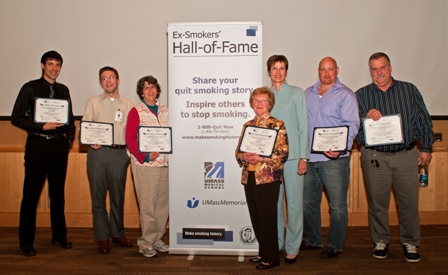 |
|
| Ex-Smoker Hall of Fame members displaying their certificates of achievement are (from left) Ryan Coffman, Ryen Welker McGrath, Kathy Burns Power, Nancy Premo, Jim Moss and Ed Rosenthal, pictured here with Lynn Nichols (third from right), president of the Massachusetts Hospital Association. | |
When members of the UMass Medical School/UMass Memorial Health Care Ex-Smokers Hall of Fame recently got together, the atmosphere was festive, supportive—and, of course, smoke-free. Joined by family, friends and medical professionals, the ex-smokers were at UMass Medical School on Wednesday, April 25, to be honored for their success in quitting smoking, and staying smoke free, at the UMass Ex-Smokers Hall of Fame and Tobacco Free Initiative 4th Anniversary Celebration.
The Ex-Smokers Hall of Fame encourages smokers to quit, and champions those who already have, through posters that highlight ex-smokers’ stories of quitting. Because so many individuals who work at UMMS and UMass Memorial quit smoking when the institutions went tobacco free four years ago, the Central Massachusetts Tobacco-free Community Partnership decided to produce the first of three Ex-Smokers Hall of Fame exhibits featuring some of them exclusively. Funded by a grant from the Massachusetts Department of Public Health’s Tobacco Cessation and Prevention Program, the partnership is one of eight regional collaborations statewide that help link local communities to state resources for tobacco intervention.
The posters unveiled at the event, created with assistance from Graduate School of Nursing students who interviewed and photographed each ex-smoker, will be displayed prominently at UMass Memorial Medical Center’s University and Memorial campuses. Sixteen individuals signed on for the project, far exceeding the goal of 12 volunteers, according to Tina Grosowsky, project coordinator for the partnership in the UMMS Department of Psychiatry, which leads the grant.
While each individual’s journey from smoker to ex-smoker is his or hers alone, common themes emerged in their stories—and in the advice they offered to other would-be ex-smokers. Whether through counseling, support groups, nicotine patches and other smoking cessation medications, spirituality, exercise or any combination of these and other techniques to stay motivated and resist nicotine cravings, each encouraged others to find what works for them and stick with it.
Many spoke of the freedom of living a life that no longer revolves around getting and smoking cigarettes, and about the money they save by not buying tobacco. Hall of Famers also reported smelling better, enjoying the taste of food more, and having more harmonious relationships with family members.
“I live life on my own terms now. I got my control back,” said Ryan Coffman, MPH, an ex-smoker who experienced his own moment of truth about needing to quit when, still a smoker while serving in the Peace Corps in Africa, he went so far as to risk his life by swimming back and forth across a crocodile-infested river to reach the only place where he could buy cigarettes. His indignation on behalf of everyone addicted to nicotine was further fueled by seeing how local villagers had become hooked by tobacco companies’ manipulative marketing campaigns, finding ways to purchase cigarettes despite living in abject poverty.
Now a compelling role model for the patients he sees as a tobacco treatment specialist and director of the UMass Tobacco Consultation Service, Coffman has made it his life’s work to help others quit smoking. Along with Grosowsky and other members of the tobacco treatment team and Central Massachusetts Partnership, he is dedicated to educating the public about the insidious tactics the tobacco industry uses to hook new tobacco users in the United States and around the world.
Ryen Welker McGrath of Employee Health was one of the hundreds of employees who took advantage of services provided by the Employee Assistance Program when UMMS and UMass Memorial went tobacco-free in 2008. McGrath attended smoking cessation sessions at UMass and used the nicotine patches made available to employees at no charge to help them make the transition.
Except for free medication, which was offered for a limited time only, the same services and supports that helped so many employees quit smoking when the Tobacco Free Initiative was launched in 2008 are still available. Employees of UMass Medical School and UMass Memorial Health Care can get help from the UMass Medical School Employee Assistance Program, and learn more about the many community-based resources that are also available at the Central MA Tobacco-Free Community Partnership website.
Related links on UMassMedNow:
Former smokers invited to inspire others to quit
Smoke-free: Three Years and Counting
Teaching the tricks of the tobacco trade